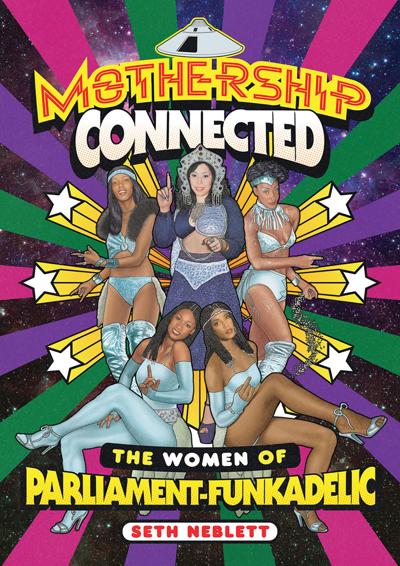
“The women of P-Funk and their legacy have been continuously, but anonymously, in plain sight since their inception,” Seth Neblett writes in Mothership Connected: The Women of Parliament-Funkadelic, out now via University of Texas Press as part of its American Music Series.
The impact of Parliament-Funkadelic members Mallia Franklin, Debbie Wright, Shirley Hayden, Dawn Silva and Lynn Mabry is everywhere — within and outside the revolutionary Afrofuturist musical collective. Franklin introduced George Clinton and Bootsy Collins, and Collins stayed with her in Detroit in the group’s early days, fusing a nuclear partnership. She also recruited Walter “Junie” Morrison — someone Clinton once called “the most phenomenal musician on the planet” — to the group. The women’s spinoff groups, Parlet and The Brides of Funkenstein, were quietly some of the collective’s most successful acts aside from Parliament-Funkadelic itself. Their work has been heard on signature P-Funk songs like “Give Up the Funk (Tear the Roof Off the Sucker)” and “One Nation Under a Groove,” and inspired later girl groups like TLC and others.
Despite all that, the women of Parliament-Funkadelic have never truly gotten their due. While performing with P-Funk, they were pitted against each other and cut out of their own royalties, leading to lifelong tensions and career setbacks. When the group was added to the Rock & Roll Hall of Fame in 1997, none of the female members were inducted or invited. When the group was honored with a Grammy Lifetime Achievement Award in 2019, they weren’t even mentioned.
That’s an oversight that Neblett’s new oral history sets out to correct through intimate, in-depth interviews with each member. Conversations with Clinton, Collins and the late, great Sly Stone — among others — appear throughout. But for once, the frontmen are supporting players. Instead, Mothership Connected lets the women tell their own story — the highs, the lows and the whole funk. What emerges is an intersectional yet compulsively readable must-have for funk fans and music history buffs. Finally, these groundbreaking female artists are getting the spotlight they’ve long deserved.
Between the interviews, Neblett himself traces the trajectory of each artist’s career and the influence that followed — including Mabry’s later work with Talking Heads, Franklin’s with Death Row Records and Hayden’s stage career. His writing is part archaeology and part constellation building, bridging differing accounts and adding critical context. He analyzes the sexualizing, anonymizing imagery of Parlet and The Brides’ album covers, The Brides’ New Wave makeover, the pressure cooker of what bassist Starr Cullars calls “the P-Funk male system” and the revived interest in the collective through hip-hop samples by De La Soul, Ice Cube and others.
He even explores the fate of the original Mothership — the massive metal spaceship prop that the group would accommodate by rehearsing in airplane hangars — which met an undignified end and was scrapped for parts in a Maryland junkyard. As he writes, it was “a sad metaphor for the state of the now-dissassembled band,” which fell apart in the midst of the 1981 Greatest Funk on Earth Tour as a result of legal, financial and addiction-related troubles. Many of the band members were never even paid for the tour. (Thankfully, a Mothership replica from the 1990s is on display at the National Museum of African American History in Washington, D.C.)
Neblett has a personal interest in bringing this history to light: Franklin, the Queen of Funk herself, was his mother. In a recollection of attending a P-Funk show at age 6, he describes her as “a long-lost love,” and establishes a personal side to Mothership Connected: a child’s attempts to understand the life and legacy of a parent who was “gone mostly” during his childhood. The way he explores her influence, and her constant fight for recognition, is especially poignant as he writes after her death at 57 in 2010.
“Even in her last days,” he notes, “my mother spent so much time proving to the world that she was The Queen of Funk. Whether she recognized it or not, she’d already earned her crown.”
In fact, at noon on Saturday, Oct. 25, he’ll continue to honor that legacy in Nashville. At the National Museum of African American Music — an institution whose motto is “One Nation Under a Groove” — Neblett and Hayden will appear for a free book talk to discuss the women’s impact, moderated by the museum’s Sydney Watson. Followed by a book signing and the donation of special P-Funk artifacts to the museum’s collection, it promises to be a truly funky affair.





